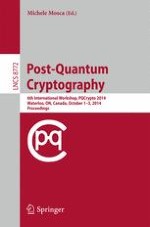2014 | OriginalPaper | Buchkapitel
A Note on Quantum Security for Post-Quantum Cryptography
verfasst von : Fang Song
Erschienen in: Post-Quantum Cryptography
Verlag: Springer International Publishing
Aktivieren Sie unsere intelligente Suche, um passende Fachinhalte oder Patente zu finden.
Wählen Sie Textabschnitte aus um mit Künstlicher Intelligenz passenden Patente zu finden. powered by
Markieren Sie Textabschnitte, um KI-gestützt weitere passende Inhalte zu finden. powered by
Shor’s quantum factoring algorithm and a few other efficient quantum algorithms break many classical crypto-systems. In response, people proposed post-quantum cryptography based on computational problems that are believed hard even for quantum computers. However, security of these schemes against
quantum
attacks is elusive. This is because existing security analysis (almost) only deals with classical attackers and arguing security in the presence of quantum adversaries is challenging due to unique quantum features such as no-cloning.
This work proposes a general framework to study which classical security proofs can be restored in the quantum setting. Basically, we split a security proof into (a sequence of) classical security reductions, and investigate what security reductions are “quantum-friendly”. We characterize sufficient conditions such that a classical reduction can be “lifted” to the quantum setting.
We then apply our lifting theorems to post-quantum signature schemes. We are able to show that the classical generic construction of hash-tree based signatures from one-way functions and and a more efficient variant proposed in [10] carry over to the quantum setting. Namely, assuming existence of (classical) oneway functions that are resistant to efficient quantum inversion algorithms, there exists a quantum-secure signature scheme. We note that the scheme in [10] is a promising (post-quantum) candidate to be implemented in practice and our result further justifies it. Actually, to obtain these result, we formalize a simple criteria, which is motivated by many classical proofs in the literature and is straightforward to check. This makes our lifting theorem easier to apply, and it should be useful elsewhere to prove quantum security of proposed post-quantum cryptographic schemes. Finally we demonstrate the generality of our framework by showing that several existing works (Full-Domain hash in the quantum randomoracle model [47] and the simple hybrid arguments framework in [23]) can be reformulated under our unified framework.
